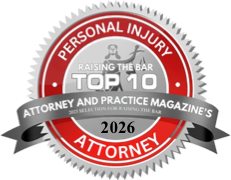Washington D.C.
Personal Injury AttorneysWhen You’ve Been Wronged, We Make It Right!
When an accident leaves you injured, it can feel like your entire world has turned upside down. You may face a lengthy recovery, expensive medical bills, and an uncertain future. With so much at stake, you need an aggressive personal injury lawyer to protect your rights and well-being. That’s where Simeone & Miller, LLP steps in.
Our firm focuses on personal injury claims, serving clients in Washington, D.C., Virginia, and Maryland. When you meet with us, we will listen to your story, understand your concerns, and address those concerns by providing compassionate, effective representation and dependable service.
We offer free consultations, and there is never a fee until we recover for you. Contact us today to get started.

Our Firm Handles All
Types of Injury ClaimsFighting for Justice and The Compensation You Deserve
At our firm, we understand that every injury case is unique, and therefore, we tailor our strategy to fit the specific circumstances of your case. For instance, what if you’re in a car accident? Where you reside can make a big difference in how we pursue your claim and the type of available coverage.
Specifically, Washington, D.C., and Maryland have different deadlines for pursuing your case than Virginia, and each of the three jurisdictions has different rules and procedures for personal injury cases. You need an attorney who understands the nuances of the applicable negligence and insurance laws and will choose the best approach.
Regardless of the incident that caused your injuries, let Simeone & Miller handle all the legal details so you can focus on recovering.
At Simeone & Miller, we have a well-earned reputation as dedicated advocates who handle the most challenging personal injury cases.
Client Testimonials
Awards & Associations
At Simeone & Miller, we serve our clients and the D.C. Metro community with the highest standards of professional excellence. Our attorneys know that behind every injury claim is someone who needs a helping hand to restore their life. When you become our client, we will provide the informed representation you need and the personalized attention you deserve.
You can depend on us to help lift your physical, emotional, and financial burdens and fight to protect your rights. Our firm regularly collaborates with a respected network of investigators, accident reconstruction specialists, and medical experts to build solid injury claims.
Above all, we will work tirelessly to get you the compensation you deserve. We have an impressive track record of success, including multi-million-dollar settlements and jury awards.
Notably, peers have recognized the attorneys at Simeone & Miller for their accomplishments, including:
- Multi-Million Dollar Advocates Forum® members
- 500 Leading Plaintiff Lawyers in the United States
- Named to Washington, DC Super Lawyers® list
- AV Preeminent™ rating from Martindale-Hubbell®
These accolades will give you confidence that our firm is the trusted choice for your personal injury case. If you or a loved one has suffered injuries due to someone else’s negligence or carelessness, we will guide you through every step and right this wrong.
Automobile Accidents /
Pedestrian AccidentsLet us help you right this wrong and protect your rights.
Being injured in an automobile, motorcycle, or scooter accident or being struck by a motor vehicle as a pedestrian can be frightening and overwhelming. Your priority is getting the medical care you need. Contacting the personal injury attorneys at Simeone & Miller should be your next step. We know how to hold negligent drivers accountable and will fight to protect your rights.
By collaborating with a respected network of accident reconstruction specialists and medical experts, we will:
- Investigate and photograph the accident site
- Identify and interview witnesses
- Document and verify your injuries
- Estimate your losses
- Explore your legal options
After we help you get the medical care you need, we will lead you to obtain the full compensation you deserve. Although many claims can and should be negotiated, we are well-prepared to litigate to achieve the best possible outcome. While no two car accident claims are the same, you will be entitled to significant compensation, including damages such as medical expenses, rehabilitative expenses, lost wages (present and future), pain and suffering, and other losses.
Motor vehicle accidents can be complicated and require not only knowing the law but also aggressively putting a case together and standing up to the responsible party or their insurance company. Simeone & Miller has over 20 years of experience in obtaining great results in automobile accident and pedestrian cases. Once you become our client, you will have comfort with our experienced car accident lawyer handling your case. Let us help you right this wrong and protect your rights.

Washington D.C. Medical
Malpractice AttorneysSupporting Victims of Medical Negligence
in Metro D.C., Virginia and Maryland
in Metro D.C., Virginia and Maryland
We place our trust and wellness in the hands of doctors and other medical professionals and expect they will provide the care we need. Unfortunately, physicians, surgeons, nurses, and medical centers may not offer the appropriate level of care, causing harm to patients.
If you have sustained injuries due to the negligence or incompetence of a healthcare provider, turn to Simeone & Miller. We have extensive experience handling medical malpractice claims and a proven history of achieving positive outcomes. Our firm has the skills and resources to tackle these challenging cases and the determination to win you just compensation.
Serving Our Clients & The Community
At Simeone & Miller, we measure our success by client satisfaction. By helping the injured and their families through their most challenging times, we have earned the admiration of our clients, peers, and the community.
Since our founding in 2002, we have achieved impressive results, recovering over $100 million for our clients and enabling them to rebuild their lives.
The Metro D.C. legal community has repeatedly recognized our efforts. Our firm has been honored by SuperLawyers, selected as a Top Lawyer by Washington Magazine, and admitted to the Multi-Million Dollar Advocate’s Forum.
Our firm is more than a business. We give our best efforts to our clients and the communities we proudly serve. We established the Simeone & Miller Good People/Good Attorneys Scholarship to help students seeking to practice law, fight for justice, and serve their community.
With Simeone & Miller, you gain a trusted partner committed to making your case our cause.

We’ve Been
Seen On:
Seen On:







Talk to a Washinton D.C.
Personal Injury Lawyer
If you or a loved one has suffered injuries in an accident that was not your fault, you may be frightened and not know where to turn. Remember, Simeone & Miller is here to help. Contact us today so we can start working on your claim.















